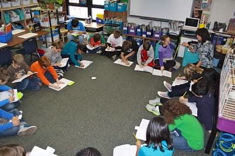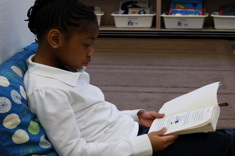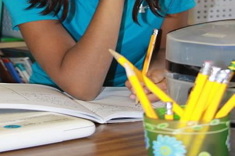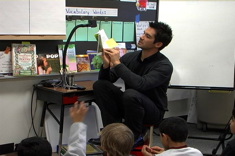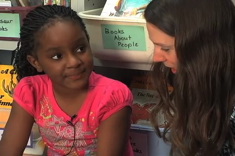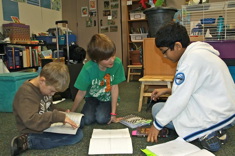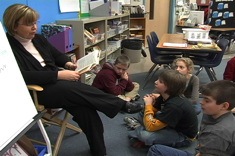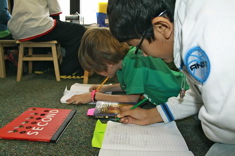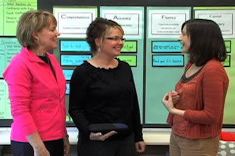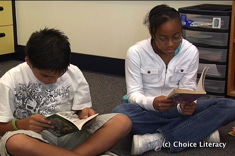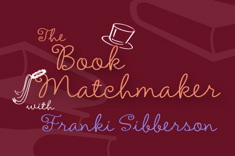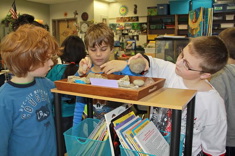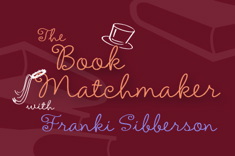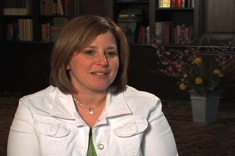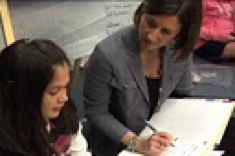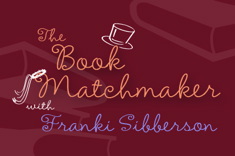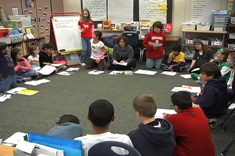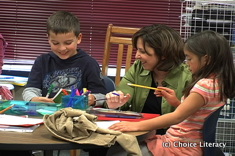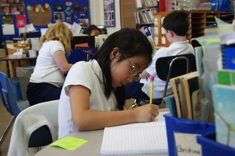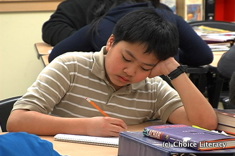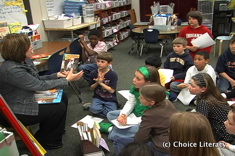5th
Latest Content
Beginning with the End in Mind: Planning Ahead for Closing Activities
Choice Literacy readers share their favorite end-of-year activities that circle back to events from the start of the school year.
Launching the Newbery Club
Bill Prosser and Maria Caplin continue their series on a Newbery Club for 5gth graders in their school. In this installment, they write about the launch of the club.
Pencil Plans
The care and use of the lowly pencil in classrooms says a lot about what we value and our relationships with students.
Read Alouds for the First Day of School
Choice Literacy readers share their favorite read alouds for the start of the year.
Injecting Writing into Everything: Prediction Stories
What happens between kindergarten and upper elementary grades to make students more hesitant about making predictions? Heather Rader has books and teaching suggestions for building prediction skills.
Book Matchmaker: New Books for Intermediate Readers
From humor to novels in verse, Franki Sibberson shares her top picks for intermediate readers in this Book Matchmaker.
Math, Writing, and Coaching to Learn
Heather Rader works with a 5th grade teacher to infuse more writing into her math curriculum.
Reflections on a Year of Read Alouds
Karen Terlecky mulls over a year of read alouds in her 5th grade classroom as she makes plans for the coming year.
Procedural Writing in Math
Heather Rader explains how mentor texts for math instruction need some specific attributes.
When to Group?
Reading groups are such an ingrained element of our teaching culture that teachers can feel guilty if they choose other instructional methods. In this conversation with fourth-grade teacher Rachel, Joan Moser and Gail Boushey (“The Sisters”) talk about when it makes sense to group students.
Literacy Rights and Responsibilities
Something bad was happening in Katie Doherty’s middle school classroom—it was time to rebuild the class community with a reality check.
Book Matchmaker: Teaching Inferring to Intermediate Students
In this installment of Book Matchmaker, Franki Sibberson discusses the challenges of finding a range of books to teach the concept of inferring to grades 3-5 students.
Reading Preferences: Social, Pleasurable, and Sometimes Awkward
Karen Terlecky connects an honest appraisal of her reading habits with an unvarnished look at her 5th grade students.
Book Matchmaker: Characters Across the Grades
In this installment of Book Matchmaker, Franki Sibberson provides a range of books for teaching character development in fiction for grades 3-5 students.
What Velcro Can Do: Science, Literacy and Coaching Connections
No time for science? Don’t like messes? Heather Rader works with a teacher and helps her find a way to fit science neatly into her full teaching day.
Choosing 5th Grade Read Alouds for the New Year
So many wonderful choices, so little time! Karen Terlecky makes her selections for a year of 5th grade read alouds.
Making Connections as a Reader and a Scientist
Heather Rader finds that reading is at the heart of scientists’ work.
Book Matchmaker: Teaching Point of View
In this installment of Book Matchmaker, Franki Sibberson provides a range of books for teaching point of view for grades 3-5 students.
Quick Takes: Advice on Book Hogs
In this quick take video, Franki Sibberson gives advice for dealing with "book hogs" — those students who try to grab any new book when it appears in the classroom library.
Parent Contributions Beyond Instructional Support
Parents want to contribute, but not all contributions are welcome or even helpful when it comes to teaching children how to read and write. Trish Prentice has suggestions for making the most of family skills and willingness to help.
Assessment Conferences: Listening to and Learning from Our Students
Research, decide, and teach – Clare Landrigan and Tammy Mulligan use Lucy Calkins’ wise advice in assessment conferences with children.
Book Matchmaker: Helping a Struggling Reader in 5th Grade
In this installment of Book Matchmaker, Franki Sibberson shares books and genres a struggling 5th grader might enjoy.
Read Alouds for the Last Days of School
Choice Literacy readers share some of their favorite read alouds for the last days of school.
You Never Know What You’re Going To Get
When students help us organize materials, we are often pleasantly surprised at the results.
Literacy Keepsakes to Carry Home at the End of the School Year
Choice Literacy readers share their favorite gifts for students to make and take home at the end of the year.
Using Picture Books to Teach Theme in Grades 3-6
Many students in the upper elementary and middle school grades shun all picture books, yet they are an invaluable resource for teaching sophisticated literacy concepts. Franki Sibberson explains how to teach the concept of theme using picture books in this booklist.
Writing Do-Overs: ERPs in the Classroom
ERP. The sound can't help but make you grin. It's Heather Rader's acronym for Explicit Revision for Peers, a series of one-minute kinesthetic writing routines to help students learn how to help each other kindly during writer's workshop.
A Sponge is a Summary
Heather Rader shares a concrete analogy that students (and teachers) love for understanding how summaries work.
Dear Mrs. T: Moving Students from Summaries to Rich Response
Karen Terlecky shares how student letter writing about books has evolved over the years. The secret? Karen uses student letters from previous years as mentor texts for moving her 5th graders from summaries to more sophisticated responses.
Character Study in Grades 3-6
A character study unit is a terrific choice early in the school year, since it taps into students' reading histories and favorites from years past. Franki Sibberson has suggestions of books and questions for use in read-alouds.
Browse Content By
Type
Category
- Assessment Tools
- Big Fresh Archives
- Booklists
- Choice Numeracy
- Classroom Design
- Common Core
- Community Building
- Conferring
- Content Literacy
- Digital Literacy
- English Language Learners
- Equity
- Family Relations
- Free Samples
- Guiding Groups
- Leadership
- Literacy Coaches
- Mentor Texts
- Minilessons
- New Teacher Mentors
- Podcasts
- Poetry
- Quote Collections
- Reading Strategies
- Self Care
- Struggling and Striving Learners
- Talking and Listening
- Teacher Study Groups
- Teaching Reading
- Teaching Writing
- Word Study and Vocabulary
Author
- Melissa Quimby
- Nawal Qarooni
- Gwen Blumberg
- Julie Cox
- The Lead Learners
- Hannah Tills
- Josie Stewart
- Ruth Metcalfe
- Mallory Messenger
- Becca Burk
- Jodie Bailey
- Vivian Chen
- Mary Brower
- Tiffany Abbott Fuller
- Stephanie Affinito
- Ruth Ayres
- Leigh Anne Eck
- Heather Fisher
- Shari Frost
- Julie Johnson
- Suzy Kaback
- Gigi McAllister
- Shirl McPhillips
- Melanie Meehan
- Cathy Mere
- Debbie Miller
- Tara Barnett and Kate Mills
- Tammy Mulligan
- Dana Murphy
- Bitsy Parks
- David Pittman
- Brenda Power
- Heather Rader
- Matt Renwick
- Mandy Robek
- Christy Rush-Levine
- Gretchen Schroeder
- Jen Schwanke
- Brian Sepe
- Katherine Sokolowski
- Stella Villalba
- Jennifer Vincent
Grade Level
Choice Literacy Membership
Articles
Get full access to all Choice Literacy article content
Videos
Get full access to all Choice Literacy video content
Courses
Access Choice Literacy course curriculum and training

